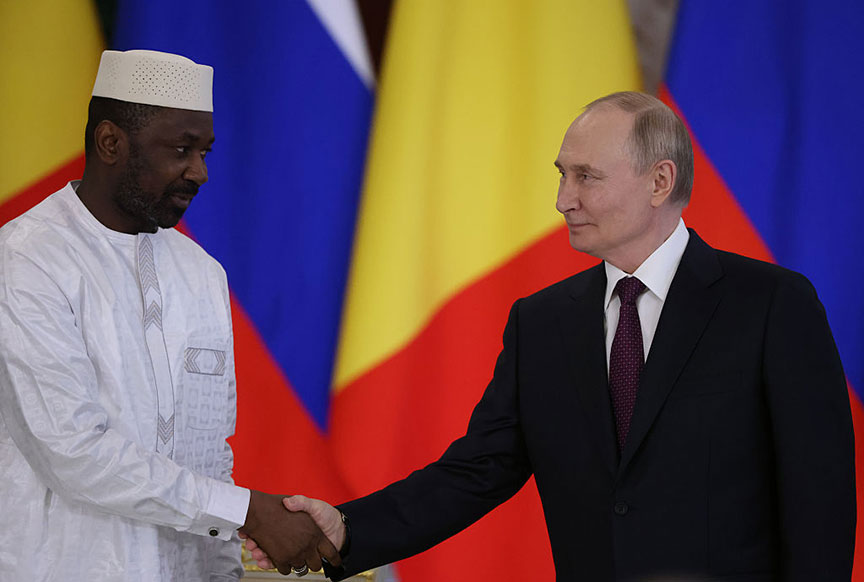The Sahel objectives of the Kremlin’s Africa Corps are similar to those of Russia’s Wagner Group mercenaries: protect ruling juntas, gain access to natural resources, secure partnerships in infrastructure and energy, and undermine Western influence through propaganda campaigns.
Because Wagner was a private company, Russia claimed it was not responsible for its actions, such as human rights violations including extrajudicial killings and torture. However, as the Timbuktu Institute noted in a recent report, the transition to Africa Corps ends Russia’s plausible deniability.
“In fact, Africa Corps now officially engages the responsibility of the Russian state, whether for conduct on the battlefield, potential war crimes, or operational failures in the field,” the institute reported.
The Russian Ministry of Defense since February has expanded Africa Corps recruitment. The Russian paramilitary force now is in Burkina Faso, Central African Republic, Libya, Mali, Niger and Sudan, according to the Rand Corp.
Africa Corps is using newly renovated Russian bases in the region, including one near the airport in Bamako, Mali’s capital. A Malian security source told the Timbuktu Institute that Africa Corps seeks to establish about 30 military bases and outposts across the country, where the Russians are deployed with Malian forces, operate from joint command posts and are integrated into national units. In Mali, Africa Corps forces provide personal security for senior military officials and work alongside gendarmerie units.
“As such, the Russian deployment aims to provide political support to military-led governments and consolidate long-term influence, without conditions of democracy or respect for human rights,” the institute reported.
Up to an estimated 80% of Africa Corps personnel are former Wagner forces, and its efforts are inspired by Wagner’s methods. The number of attacks and fatalities committed by terrorist groups have increased significantly since Russian mercenaries replaced United Nations and West African security forces in Africa. An analysis of public sentiment shows that populations in several African countries hold more negative than positive views of Russian mercenaries, especially in Côte d’Ivoire, Mali, Niger and Togo, according to the Rand Corp.
Around the Sahel and West Africa, Russia’s African Initiative, a messaging platform, trumpets Africa Corps as a stabilizing force and emphasizes Russia’s image as a force capable of restoring order in states that have experienced coups. Junta leaders typically cite security challenges as justification for hiring Russian mercenaries.
“However, the increasing violence, human rights abuses, and negative public sentiment regarding mercenary tactics demonstrate that the presence of Russian mercenaries worsens the problems that they have been hired to address,” the Rand Corp reported.
Africa Corps and Malian forces in June were accused of executing civilians in Kidal, Mali. In Abelel, Eghacher-Sedide and Ibdakan, the combined forces burned civilians alive and threw them into wells, according to the Armed Conflict Location and Event Data project.
On June 13, the Azawad Liberation Front ambushed an Africa Corps and Malian Armed Forces logistics convoy near Aguelhok. The group claimed that it destroyed more than 20 vehicles and killed dozens of forces. Reuters reported at least 23 Russian fighters died in the attack, many of whom were Wagner veterans previously deployed in Syria and Ukraine. The Timbuktu Institute characterized this event as Africa Corps’ “first major loss on the battlefield.”
Since April, Haut-Mbomou, on the CAR’s border with the Democratic Republic of the Congo, has experienced escalating ethnic tensions and clashes between the Azande Ani Kpi Gbe (AAKG), a predominantly ethnic Azande armed group, and Central African Armed Forces and Africa Corps. The violence has displaced at least 10,000 civilians, according to the U.N., and dozens have been killed. In the southeastern CAR town of Obo, panic ensued when word spread of Africa Corps mercenaries arriving to disarm AAKG fighters.
“It’s fear that’s driving people to flee,” Arsène Doukazima Kété, Obo’s municipal counselor, told the Global Centre for the Responsibility to Protect in May. “The town is virtually empty. The population is traumatized by the recent events in Zémio and Mboki,” which also have recently experienced increasing insecurity and humanitarian crises.

